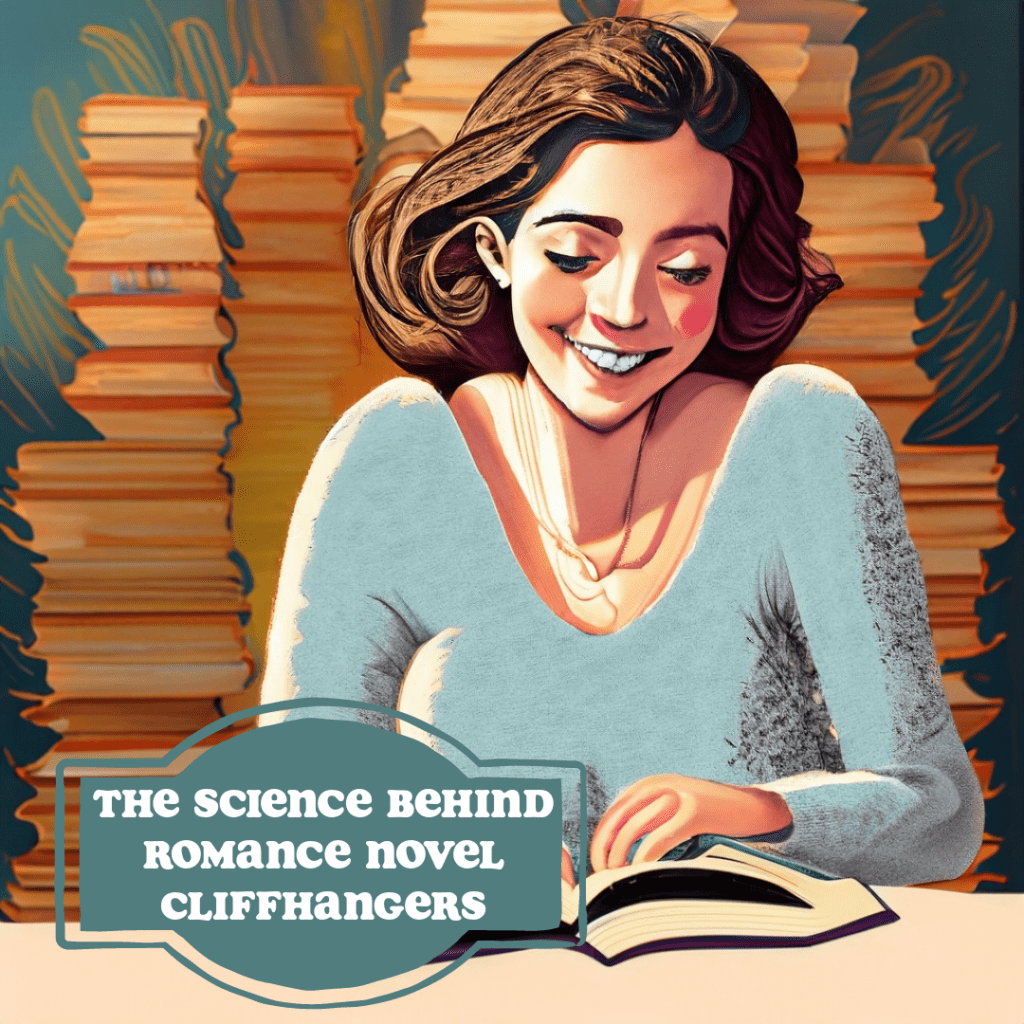The Science Behind Romance Novel Cliffhangers

You’ve been there—the clock is ticking past midnight, your eyes are heavy, but you’re hanging on every word. The protagonist finally admits her feelings, and then—bam! The chapter ends with a mysterious text, an unexpected knock on the door, or a sudden revelation. You’re now caught in the magnetic pull of a “cliffhanger,” a literary device that leaves you at the edge of your seat, thirsty for what comes next.
A friend of mine once described her experience reading a romance novel like “falling into a rabbit hole.” She planned to read just a few chapters before bed, but a suspenseful cliffhanger led her to turn page after page until she realized it was 4 a.m. And she’s not alone. Many of us have been captivated by these carefully crafted moments that make putting the book down almost impossible.
So, what is it about cliffhangers in romance novels that hooks us so deeply? Why do they turn even the most disciplined readers into insomniacs? In this article, we’re going to delve into the science behind the addictive nature of cliffhangers, specifically in romance novels. We’ll explore how these tantalizing twists tickle our brains, tap into our emotions, and keep us coming back for more.
Part I: The Anatomy of a Cliffhanger
What Makes a Cliffhanger?
A cliffhanger is like the secret sauce in your favorite dish; you may not know all the ingredients, but you sure know it’s irresistible. In essence, a cliffhanger is a storytelling device that ends a chapter, scene, or even an entire book on an unresolved matter or emotional peak. It serves three main purposes:
- Suspense: It introduces an element of unpredictability or danger.
- Curiosity: It presents an unanswered question or unsolved mystery.
- Emotional Involvement: It leaves characters—ones you’re invested in—hanging in the balance.
Combine these elements, and you’ve got yourself a perfect cliffhanger. Now, let’s address why this is particularly impactful in romance novels.
Why Romance Novels?
You might say that romance novels and cliffhangers are a match made in literary heaven. Why’s that? Well, there are a couple of key reasons:
- Emotional Stakes: Romance is all about emotional journeys. When a cliffhanger is introduced, it’s not just a plot twist; it’s a twist of the heart. This amplifies your need to know what happens next.
- Character-Driven Stories: Unlike other genres that may rely heavily on action or intricate plotting, romance novels often center around character development. When you’re emotionally tied to a character, a cliffhanger that affects them becomes incredibly potent.
- Reader Expectations: People read romance for the emotional rollercoaster, hoping for a happy ending but savoring the ups and downs along the way. Cliffhangers fuel this rollercoaster, adding unexpected drops and turns that make the journey exhilarating.
By understanding the anatomy of a cliffhanger and why it’s so impactful in romance novels, we set the stage for diving deeper into the science and psychology that make them so addictive. So hold tight; it’s going to be an intriguing ride!
Part II: The Reader’s Journey
Emotional Investment
So, you’ve found a romance novel that you can’t put down. Ever wonder why? It starts with emotional investment. When we read, we’re not just scanning words on a page; we’re building relationships with the characters and deeply caring about their outcomes. Here’s why emotional investment is so pivotal:
- Connection: It’s the “aww” moments when the characters first meet, the tension during their first fight, and the relief when they make up. These build a bond between you and the characters.
- Empathy: As the characters struggle, you struggle. As they rejoice, you rejoice. You become emotionally tied to their highs and lows.
- Identification: Sometimes, these characters express feelings or face situations that resonate with your own life. That personal link boosts your investment even more.
And it’s this emotional investment that makes the cliffhanger in a romance novel a major life event rather than just a plot device. You’re not just hooked; you’re emotionally tied in knots.
The Rush of Uncertainty
Let’s face it: unpredictability adds spice to life, and it’s the same for romance novels. You’re cruising along a well-worn path when suddenly, a cliffhanger swerves you into uncharted territory. But what does that do to you emotionally?
- Adrenaline Spike: The sudden twist triggers a release of adrenaline. You’re more alert, focused, and—let’s admit it—a bit excited about what comes next.
- Dopamine Release: That’s the “feel-good” neurotransmitter. It comes into play when something unexpected and interesting happens, urging you to find out more.
- Satisfying the Curiosity Gap: Humans don’t like incomplete stories or unanswered questions. Cliffhangers make us crave closure, pushing us to read ‘just one more chapter.’
The result? A cocktail of psychological and biochemical reactions that makes the cliffhanger an emotional dynamo, not easily ignored.
Part III: The Science Unveiled
Brain Chemistry
So, it’s late at night and you swear you’re reading just “one more chapter.” Next thing you know, you’ve plowed through another fifty pages. Why? Meet your brain’s cocktail of neurotransmitters:
- Dopamine: This “feel-good” neurotransmitter is released when you’re faced with something new and intriguing—like a cliffhanger. It gives you that pleasurable ‘high’ and motivates you to seek more.
- Adrenaline: When the story takes an unexpected twist, adrenaline kicks in. This “fight-or-flight” hormone sharpens your focus, making you hyper-aware of every detail that follows.
- Oxytocin: Often referred to as the “love hormone,” oxytocin is produced when we form social bonds, including fictional ones with characters. It heightens our empathy and investment in the storyline.
In a nutshell, your brain is pretty much programmed to get hooked on cliffhangers. It’s a physiological reaction, not just an emotional one.
Psychological Theories
If you thought neurotransmitters were the end of the story, hold tight. Psychological theories offer more layers to this onion:
- FOMO (Fear of Missing Out): Think of the cliffhanger as the ultimate FOMO trigger. You’re terrified of missing out on crucial developments, so you’re compelled to read on.
- Zeigarnik Effect: This psychological principle states that people remember uncompleted tasks better than completed ones. Your mind nags you to find closure, nudging you to continue reading.
- Operant Conditioning: This is a learning process where the consequence of a behavior (like reading on) increases the likelihood that the behavior will be repeated. Each cliffhanger serves as a ‘reward’ that conditions you to keep going.
- Narrative Transportation: This theory suggests that when you’re engrossed in a story, you’re mentally ‘transported’ to the story’s world, making it difficult to disengage.
Both your brain chemistry and psychological frameworks are co-conspirators in making cliffhangers irresistible. So, the next time you find yourself reading way past your bedtime, you’ll know it’s not just a lack of willpower; there’s a whole science at play, luring you in.
Part IV: The Impact on the Reader
Hooked for the Next Chapter
So, you’ve reached a cliffhanger. The room is thick with tension, and you’re dying to know what happens next. Here’s what that does for reader retention:
- Loyalty: Cliffhangers give you a compelling reason to stick with a series. Each cliffhanger serves as a ‘teaser’ for the upcoming chapters or books, making you less likely to jump ship.
- Word-of-Mouth: When a cliffhanger has you at the edge of your seat, chances are you’re going to talk about it. Whether it’s through social media or in-person chats, you become a natural advocate for the book or series.
- Instant Gratification: In the age of digital books and online shopping, the next chapter or sequel is just a click away. This instant availability often translates to immediate purchases, upping reader retention.
The Double-Edged Sword
While cliffhangers can be wildly effective, they’re not without their pitfalls:
- Reader Burnout: The constant emotional highs and lows can be exhausting. This could eventually lead to reader fatigue, causing you to disengage from the series altogether.
- Unrealistic Expectations: The rollercoaster of emotions in a romance novel can sometimes create idealized notions about love and relationships. This disconnect between fiction and reality may set up unrealistic expectations for your own romantic life.
- The Risk of Disappointment: Not all cliffhangers lead to satisfying resolutions. If the following chapter or book doesn’t deliver on the built-up tension, you may feel let down, affecting your overall experience.
Part V: Tips for Managing Your Romance Novel Addiction
Set Boundaries
We’ve all been there—planning to read just one chapter and finding ourselves up until 2 a.m. So how can you manage your time better?
- Time Blocks: Allocate specific time blocks in your day for reading. Stick to them as you would any other appointment.
- Bookmark and Step Away: When you hit a cliffhanger, take a deep breath, bookmark the page, and step away. Your curiosity can wait, and you’ll savor the story more if you’re not rushing through it.
- Tech-Free Zone: Make your bedroom a tech-free zone to avoid the temptation of immediately downloading the next book in a series.
Diversify Your Reading
If all you’re reading is romance, the emotional rollercoaster can become overwhelming. To maintain a sense of balance, it’s good to diversify:
- Switch Genres: Alternate between romance and other genres like mystery, history, or science fiction to give your emotions a breather.
- Non-Fiction Mix: Throw in some non-fiction to your reading list. This will not only expand your knowledge but also help break the constant cycle of highs and lows that romance novels offer.
- Join a Book Club: Being part of a book club can introduce you to a variety of genres and topics you might not have picked up otherwise. Plus, it’s a great way to discuss your reactions and reflections on different kinds of books.
Conclusion
We’ve gone on quite a journey, haven’t we? From dissecting the elements that make cliffhangers so tantalizing to delving into the brain chemistry and psychological theories that explain their addictive nature. We’ve also touched upon the double-edged sword of reader engagement—how cliffhangers keep us hooked but can also lead to burnout or skewed perceptions of real-life romance. Finally, we offered some practical tips for managing your romance novel addiction, advocating for a balanced approach to your reading habits.
Here’s the thing: understanding the “why” behind our behaviors gives us the power to manage them better. Now that you’re armed with this knowledge, you’re in a stronger position to control your reading choices rather than letting them control you.
Reading is one of life’s greatest pleasures. And yes, the allure of cliffhangers in romance novels is hard to resist. But guess what? You don’t have to resist; you just have to be mindful. Be the captain of your own reading ship, steering through the emotional waves while enjoying the view.
Go ahead, dive back into your romance novels or any other genre that tickles your fancy. Just remember, awareness is the first step towards making informed decisions. Here’s to being smarter, wiser readers who can enjoy the highs without crashing on the lows.
Happy reading, everyone!
